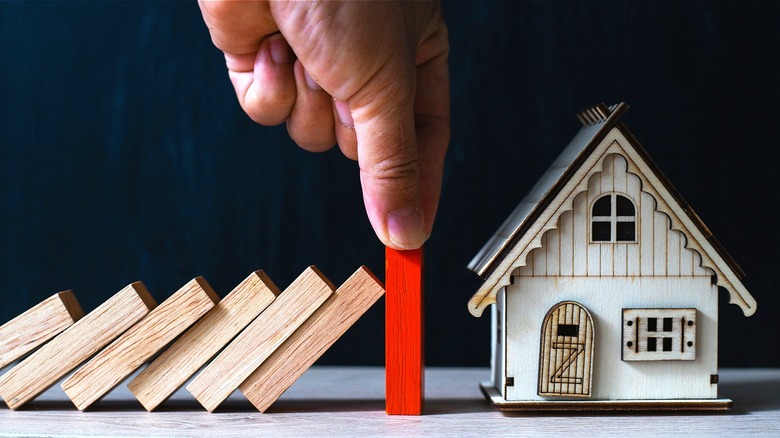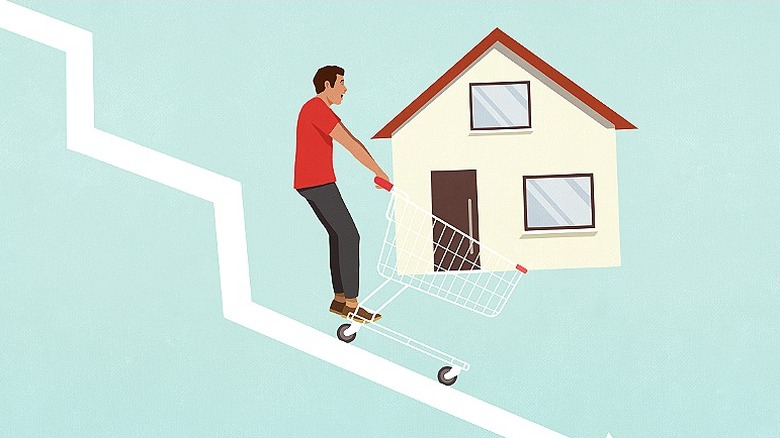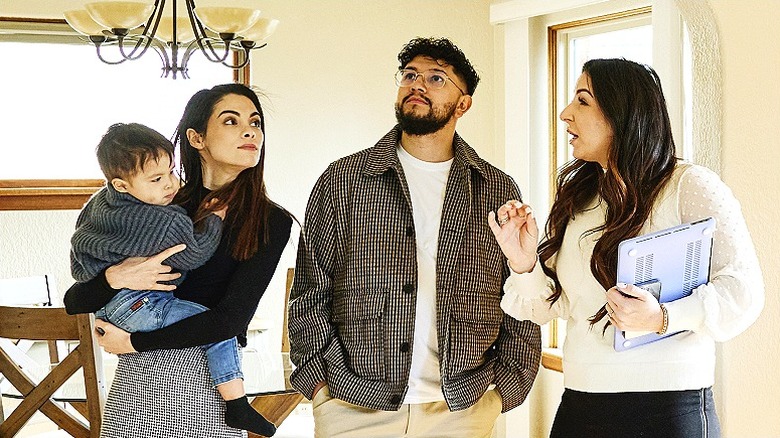What Does A Housing Market Crash Mean For Homeowners?
We may receive a commission on purchases made from links.
A housing market crash is an ominous occurrence, and one that brings back a flurry of bleak memories. This century, the American economy has experienced not one but two significant meltdowns, with the first coming as a result of a hyperinflated housing market that ultimately crashed and burned. Bear markets come and go, but extreme crashes like the one that took place in 2008 are unicorns, of sorts. They don't happen often, and when they do, there's severe calamity, and people across the marketplace experience dramatic losses that go beyond simple trading or savings metrics.
Speaking with experts helps to put things into perspective, and we reached out to Betsy Pepine for some clarifying wisdom on this matter. She's the founder and CEO of Pepine Realty and the author of "Breaking Boxes: Dismantling the Metaphorical Boxes That Bind Us." Her expertise in the real estate arena is invaluable when it comes to understanding where things stand today, what we can expect moving forward, and some of the warning signs that homeowners, buyers, and sellers should be wary of, indicating a potential housing market crash (or at the very least a marketplace retraction that hurts consumers even without causing total devastation).
The consequences of a housing market crash
The consequences of a marketplace collapse are devastating. Consumers saw the effects of a crash in the 2000s, and likely aren't eager to go back to those extremely concerning years. As Betsy Pepine told us, "A housing market crash would mean home values will plummet, and inventory will be hard to sell off." For homeowners, this can lead to unique and potentially long-lasting trouble that leaks out of the financial realm and begins to affect other elements of their lifestyle.
Said Pepine, "Homeowners could be stuck in homes they no longer want or forced to sell at a price lower than what they own on the house. In this case, the seller is forced to bring cash to the closing table or do a short sale. This increases the risk of foreclosure. In addition, homeowners face financial and emotional stress, and lowers consumer spending, impacting the larger economy."
A sharply reduced value in real estate across the board prevents all manner of interconnected decisions from being made. You might routinely consider new job opportunities that would have your family pack up and move, for instance. This is no longer an option, though, if the housing market crashes and your home value plummets. Meanwhile, if you lose your job — a real possibility in a shrunken marketplace kicked off by housing market instability — moving might be the only option, adding further to the emotional and mental desperation present.
More recent buyers will be affected the most
The problems for homeowners that come with a housing market collapse are seen most prominently among those with the least amount of equity in their property, according to Betsy Pepine. "Because many new homeowners are first-time buyers with higher mortgage debt and lower down payments, they have less equity and would be more impacted by a crash," she explained. While what you bought your home for remains a static figure, your loan balance doesn't fluctuate — even though your home value can and does regularly.
This means that if your home loses 25% of its value, you don't also owe 25% less to the bank. Selling at a loss doesn't eliminate your debt and can actually lead desperate sellers to pay the remaining balance out of pocket, leaving them in a terrible position when looking for a new place to live. On the flip side, if you own your home outright, a crash will still affect your decision to sell, squeezing your decision-making capabilities, but it doesn't come with the same threat of financial ruin that bank-involved properties carry.
Newer buyers aren't the only people who have to worry, here, though. Said Pepine, "Those with higher rates (for example those with adjustable-rate mortgages) are also more at risk because the higher the house payment, the less money you have to buy other essential items. Also, any homeowner who bought at the peak is more affected because they will experience negative equity if the market turns quickly." The market is fraught with peril for all kinds of buyers, but those already in weakened positions in terms of their home's equity standing have the most to lose in a souring market.
Key indicators and the near-term outlook
Fortunately, Betsy Pepine and economists across the board don't foresee a housing market crash coming into American lives in the near future. "It's very unlikely we will experience a housing market crash," Pepine said. She does spell out some struggles that remain hovering over the market, however: "Inventory levels are still very low relative to demand, not having recovered from the 2008 recession and supply chain issues during the pandemic. A neutral market is six months' supply. Nationally we are hovering near a three-month supply, making it a seller's market."
As well, she noted that "interest rates, while high compared to recent years, are still very affordable and are comparable to rates in the early 2000s. In addition, the rate of price appreciation is stabilizing to historical norms of 3-5%. Finally, national elections historically slow housing markets down in the months leading up to the election and then rebound and are even stronger the year following a presidential election."
Even so, potential sore spots can eventually become large-scale problems; Pepine offered some parting wisdom for homeowners and shoppers to keep a keen eye out for. "Key signs of a housing bubble include when rapid and unsustainable price increases plateau," she said, along with "increased mortgage debt with low equity and risky lending practices, rising mortgage rates, increased surplus inventory, and when buying becomes significantly more expensive than renting."
Lastly, these events don't happen in a vacuum, and trending changes can signify that the market may be heading toward greater uncertainty, or perhaps even a crash, given the right blend of turbulent economic woes. With that said, things do look relatively stable in the present. (Read about 11 things first-time homebuyers always get wrong about buying a house.)



